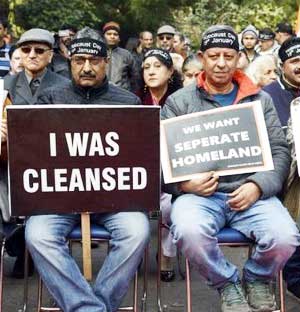Every year, the Kashmiri Pandit community observes January 19 as the 'Holocaust Remembrance Day/Exodus Day' to mourn the loss of lives, homes, livelihoods, language, culture, Kashmir and Kashmiriyat.
For the community, the day is also to remember the failure of the administration, political leaders, civil society and the loss of humanity.
It is not that on January 19, the whole of the Kashmiri Hindu community fled Kashmir; many stayed back in the hope that harm wouldn't come to them. However, massacres continued, targeted killings kept on happening, kidnappings, rapes, assaults, loot and arson and harassment continued.
According to an estimate by a local organisation, Kashmir Pandit Sangharsh Samiti (KPSS), which surveyed in 2008 and 2009, a total of 399 Kashmiri Hindus were killed by insurgents from 1990 to 2011, with 75 per cent of them being killed during the first year of the advent of terrorism.
An RTI filed last year said that 89 Kashmiri Pandits were killed in attacks since the inception of militancy in 1990. The numbers are disputed because many Kashmiri Pandits could not get FIRs filed and have no police record.
On March 23, 2010, the then J&K Revenue Minister Raman Bhalla told the Assembly in Jammu that "219 Pandits were killed in Kashmir from 1989 to 2004."
The numbers may be disputed, but what happened 35 years ago cannot be disputed.
The entire Muslim majority population kept its eyes and ears shut as the minuscule Kashmiri Pandits were singularly targeted. As fanatics danced on the Valley streets, loudspeakers atop mosques roared with hate slogans, threatening to rape and kill the 'kafirs' if they failed to leave Kashmir. "Raliv, galiv, chaliv (convert, die, flee)" were the options given to the Hindus.
There was no one to stop the radicalised mobs that had taken over everything in the valley, and there was no one to put an end to the venomous speeches. In the name of "Azadi (freedom)" there was something else happening. It was the purging of the Hindus so that their places could be taken and their properties usurped. The whole so-called freedom moment was for total Islamisation of the valley so that the merger with Islamic Pakistan could be done easily.
The then administration had totally withered away; the police had become non-functional, with some deeply involved with the terrorists. There was no one the minority community could turn to. The Pandit parents were ready to kill their women and girls as the frenzied crowds on the roads meant only violence. Many women were kidnapped and brutally violated.
None of the leaders -- Farooq Abdullah, the late Mufti Mohammad Sayeed, Saifuddin Soz, Ghulam Nabi Azad, and others -- who claim to be votaries of secularism were there to come to help the minorities in the valley.
Farooq Abdullah was the Chief Minister of J&K from 1986-1990. Mufti Mohammad Sayeed was the Union Home Minister (1989-1990). It was under their watch that terrorism crept in and then flourished in Kashmir.
The maximum number of targeted killings of Kashmiri Pandits, Sikhs and all those who were seen as 'pro-India', brutal gang-rapes and killing of Pandit women, desecration of temples, kidnappings, attacks and harassment of the valley's minority were happening when the two were at the helm.
Warnings were pasted on the doors and walls of Kashmiri Pandit homes, open threats were published in local newspapers, and messages were conveyed to targeted people to leave or die.
There was no political leader or anyone from the majority Muslim community, no civil society member, either in the erstwhile state or in New Delhi, to stand up and try to stop the persecution.
January 19 also exposes the hollowness of the country's top constitutional institutions, which failed to take note of the atrocities and investigate and prosecute all those involved in the persecution and exodus of their fellow citizens.
Three decades after the mass exodus, none of the successive governments at the Centre or in the state set up a commission or formed an SIT to probe the exodus.
January 19 is the day to remember the failure of the Kashmiriyat and also the failure of the democratic pillars – legislature, executive and judiciary.




New Urban Community Health Centre to reduce patients rush in GBP Hospital: CM Dr Manik Saha
Chief Minister Dr Manik Saha on Thursday laid foundation stone of 50-bed Urban Community Health Center here at Agartala and said that the present government is working diligently to improve health infrastructure and services in the state.
Govt determined to develop sports infrastructure in Tripura: CM Dr Manik Saha
Chief Minister Dr Manik Saha on Thursday inaugurated football turf, athletics track and hockey ground here at Agartala Dasarath Deb Sports Complex at Badharghat and said that the government is determined to develop facilities and platform for sports persons in the state.
Mistake that benefits no one: World leaders react to Trump's 'reciprocal tariffs'
As US President Donald Trump signed an executive order on the so-called "reciprocal tariffs," the world reacted sharply against the decision, with some calling it a "mistake that benefits no one" while others called it a violation of Washington's obligations under the World Trade Organization (WTO).
Indian pharmaceutical exports get reprieve from Trump’s reciprocal tariffs
Because of the importance of India’s pharmaceuticals to US healthcare, those exports will get a reprieve from President Donald Trump’s reciprocal tariffs, according to the White House.
India stands less impacted by Trump tariffs than global peers: Industry
As US President Donald Trump announced reciprocal tariffs on dozens of countries, including India, industry experts said on Thursday that it appears India's export competitiveness to the US market stands far less impacted on a relative basis compared to global peers.
IAF pilot killed, another critical as Jaguar fighter jet crashes in Gujarat
An Indian Air Force (IAF) pilot lost his life, while another sustained critical injuries after their two-seater Jaguar fighter jet crashed near Gujarat's Jamnagar Airfield, the IAF confirmed on Thursday.
PM Modi emplanes for Thailand; to attend BIMSTEC summit
Prime Minister Narendra Modi on Thursday emplaned for Thailand on a state visit to attend the 6th BIMSTEC Summit, with his visit also set to bolster bilateral relations between New Delhi and Bangkok.
Bhavan’s Little Learners celebrate annual programme
The Bhavan’s Little Learners, Bordowali celebrated annual programme and organised prize distribution ceremony here at Agartala Rabindra Satabarshiki Bhavan on Wednesday.